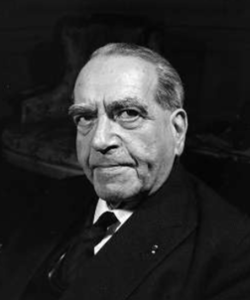Pál Auer (1885-1978), Hungarian lawyer, politician and diplomat.
© Article written by Gabriel Godeffroy for the Central Europe Foundation
Photo: Charles Forgács, “Pál Auer”, 1963, Hungaricana.
After studying Law at the University of Budapest, and visiting Vienna, Berlin, Paris and London, Pál Auer successfully passed the bar exam in 1911. Subsequently, he opened his office in Budapest and specialized in International Law. Following the collapse of Austria-Hungary at the end of the First World War, Pál Auer was a member of Mihály Károly's National Council. After a period of political instability in Hungary, during which he lived in Vienna, Auer returned to Budapest. In 1921, he was appointed legal adviser to the French legation in Hungary. In this capacity, he participated “discreetly in the evolution of official Franco-Hungarian relations” in the 1920s and 1930s.
During the interwar period, Pál Auer participated in the activities of the Paneuropean Union, presided by the Count Richard Coudenhove-Kalergi. From 1930, he was the President of the Hungarian section of the Paneuropean Union. Like Elemér Hantos, Auer was also in favor of deepening economic and political cooperation between the successor states of Austria-Hungary. That is why he organized a Danubian conference in Budapest in February 1932.
Following this conference, he presided the Committee for the economic rapprochement of the Danubian countries. For him, a “Danubian confederation” was particularly important to prevent the annexation of Austria by Nazi Germany. After the Second World War, Pál Auer became a member of the Hungarian Parliament and the President of its Foreign Affairs Committee. In March 1946, Auer was appointed Head of the Hungarian legation in Paris. Following the Communist seizure of power in 1947, Auer was “forced to choose exile” and stayed in Paris, where he remained a “mediator between Central Europe and France”. Auer was also very active in the European Movement, initiated by
Winston Churchill. Until his death, he defended the concept of a “Danubian confederation”.
--Gergely Fejérdy, "Paul Auer : un médiateur hongrois entre la France et l’Europe
médiane", (Antoine Marès (dir.), La France et l’Europe centrale: médiateurs et
médiations, Paris : Institut d’études slaves, 2015)
--Pál Auer, “Initiatives Toward Cooperation in the Danubian Basin in the 19th and 20th Centuries” (Francis S. Wagner (ed.), "Toward a New Central Europe: a Symposium on the Problems of the Danubian Nations", Astor Park, Florida: Danubian Press, 1970)

